Critically Assessing Corporate Social Responsibility and Codes
VerifiedAdded on 2022/08/20
|12
|3411
|12
Essay
AI Summary
This essay critically assesses the concept of Corporate Social Responsibility (CSR) and whether companies should subscribe to CSR codes, supported by ethical theories. The paper defines CSR as the relationship between global corporations, governments, and citizens, emphasizing its role in promoting economic welfare, environmental protection, and employee well-being. The discussion evaluates company adherence to CSR codes, highlighting the strategic importance of CSR for businesses and the influence of stakeholder pressure. Ethical perspectives are integrated, underscoring the importance of ethics in CSR practices. The essay explores utilitarian theory, comparing its approach to current CSR practices, and discusses the relationship between CSR and business ethics, including the normative stakeholder theory. Real-world examples, such as Central Global Berhad, are used to demonstrate the practical application of CSR codes and their alignment with ethical principles, showcasing how companies can promote environmental and social responsibility. The essay concludes by emphasizing the importance of ethical duties in CSR and the impact of ethical business behavior on stakeholders and the economy.
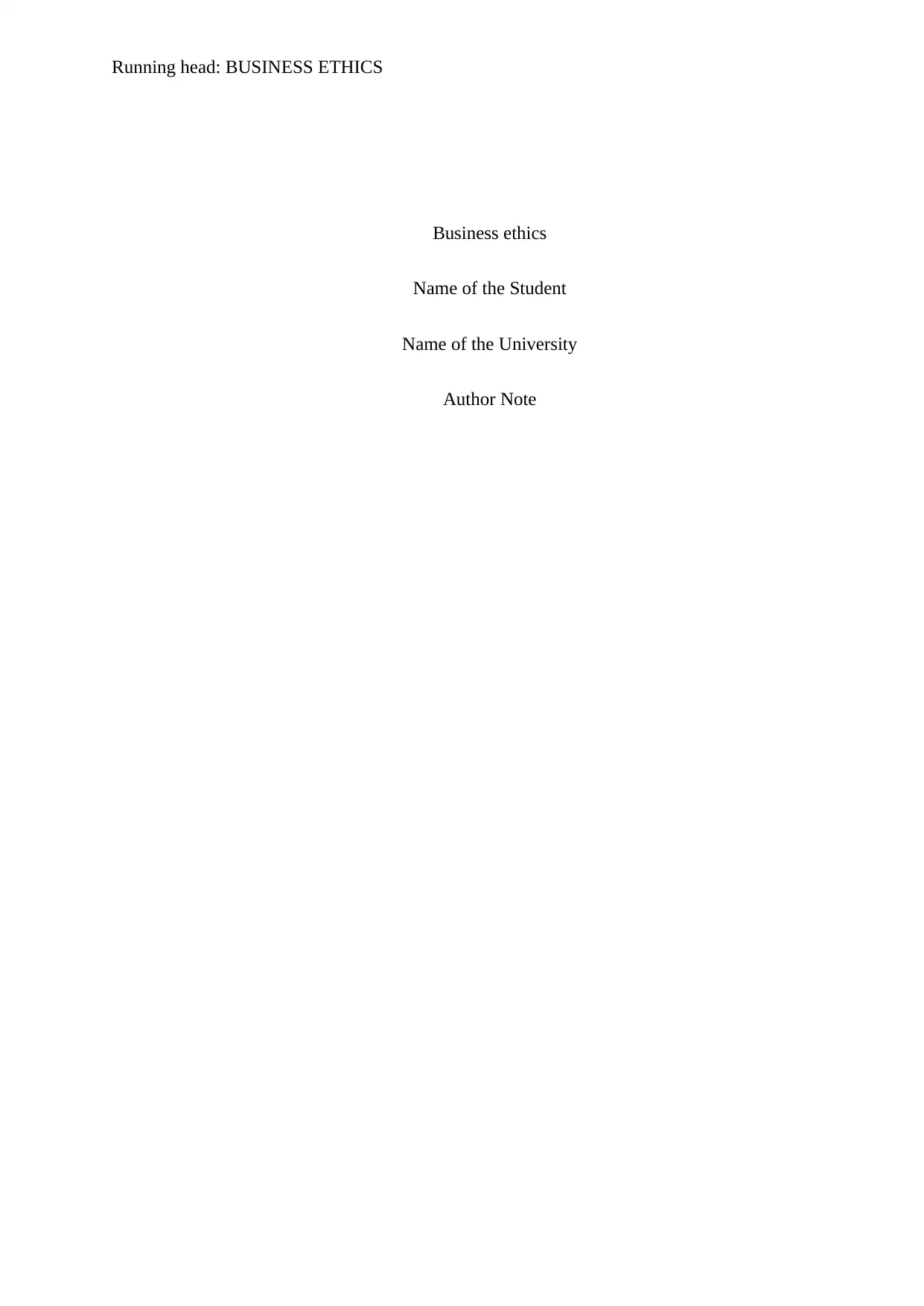
Running head: BUSINESS ETHICS
Business ethics
Name of the Student
Name of the University
Author Note
Business ethics
Name of the Student
Name of the University
Author Note
Paraphrase This Document
Need a fresh take? Get an instant paraphrase of this document with our AI Paraphraser
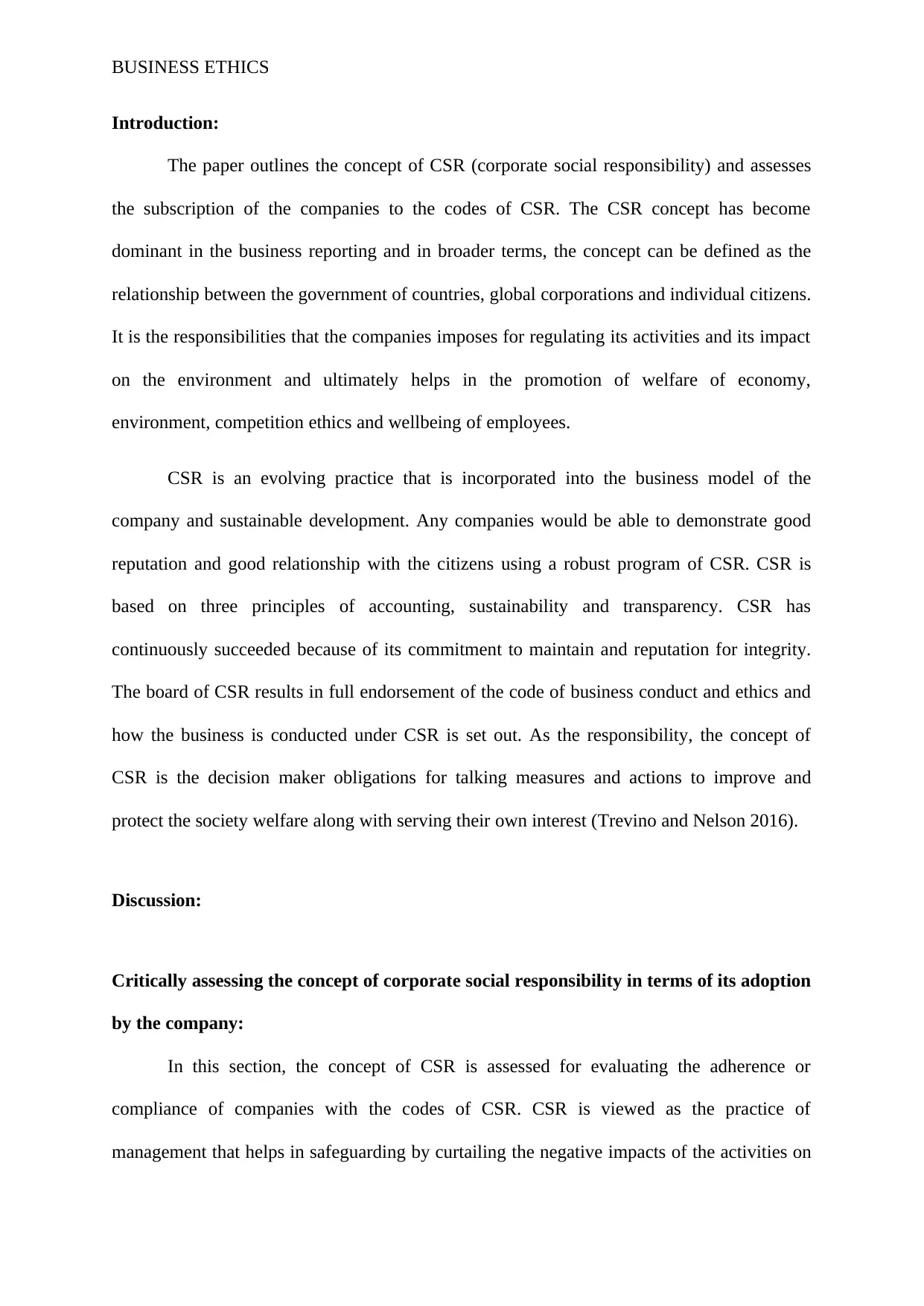
BUSINESS ETHICS
Introduction:
The paper outlines the concept of CSR (corporate social responsibility) and assesses
the subscription of the companies to the codes of CSR. The CSR concept has become
dominant in the business reporting and in broader terms, the concept can be defined as the
relationship between the government of countries, global corporations and individual citizens.
It is the responsibilities that the companies imposes for regulating its activities and its impact
on the environment and ultimately helps in the promotion of welfare of economy,
environment, competition ethics and wellbeing of employees.
CSR is an evolving practice that is incorporated into the business model of the
company and sustainable development. Any companies would be able to demonstrate good
reputation and good relationship with the citizens using a robust program of CSR. CSR is
based on three principles of accounting, sustainability and transparency. CSR has
continuously succeeded because of its commitment to maintain and reputation for integrity.
The board of CSR results in full endorsement of the code of business conduct and ethics and
how the business is conducted under CSR is set out. As the responsibility, the concept of
CSR is the decision maker obligations for talking measures and actions to improve and
protect the society welfare along with serving their own interest (Trevino and Nelson 2016).
Discussion:
Critically assessing the concept of corporate social responsibility in terms of its adoption
by the company:
In this section, the concept of CSR is assessed for evaluating the adherence or
compliance of companies with the codes of CSR. CSR is viewed as the practice of
management that helps in safeguarding by curtailing the negative impacts of the activities on
Introduction:
The paper outlines the concept of CSR (corporate social responsibility) and assesses
the subscription of the companies to the codes of CSR. The CSR concept has become
dominant in the business reporting and in broader terms, the concept can be defined as the
relationship between the government of countries, global corporations and individual citizens.
It is the responsibilities that the companies imposes for regulating its activities and its impact
on the environment and ultimately helps in the promotion of welfare of economy,
environment, competition ethics and wellbeing of employees.
CSR is an evolving practice that is incorporated into the business model of the
company and sustainable development. Any companies would be able to demonstrate good
reputation and good relationship with the citizens using a robust program of CSR. CSR is
based on three principles of accounting, sustainability and transparency. CSR has
continuously succeeded because of its commitment to maintain and reputation for integrity.
The board of CSR results in full endorsement of the code of business conduct and ethics and
how the business is conducted under CSR is set out. As the responsibility, the concept of
CSR is the decision maker obligations for talking measures and actions to improve and
protect the society welfare along with serving their own interest (Trevino and Nelson 2016).
Discussion:
Critically assessing the concept of corporate social responsibility in terms of its adoption
by the company:
In this section, the concept of CSR is assessed for evaluating the adherence or
compliance of companies with the codes of CSR. CSR is viewed as the practice of
management that helps in safeguarding by curtailing the negative impacts of the activities on
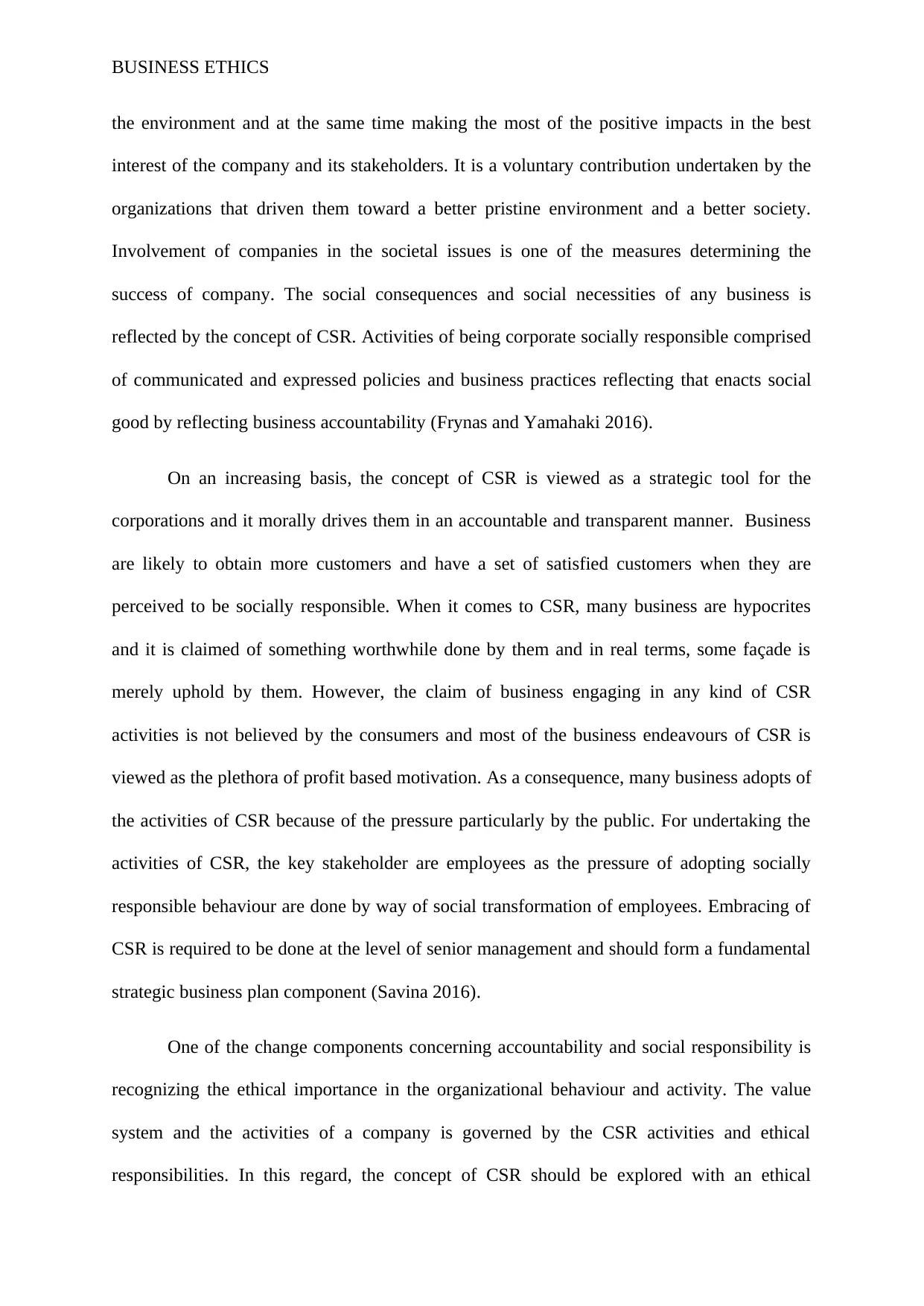
BUSINESS ETHICS
the environment and at the same time making the most of the positive impacts in the best
interest of the company and its stakeholders. It is a voluntary contribution undertaken by the
organizations that driven them toward a better pristine environment and a better society.
Involvement of companies in the societal issues is one of the measures determining the
success of company. The social consequences and social necessities of any business is
reflected by the concept of CSR. Activities of being corporate socially responsible comprised
of communicated and expressed policies and business practices reflecting that enacts social
good by reflecting business accountability (Frynas and Yamahaki 2016).
On an increasing basis, the concept of CSR is viewed as a strategic tool for the
corporations and it morally drives them in an accountable and transparent manner. Business
are likely to obtain more customers and have a set of satisfied customers when they are
perceived to be socially responsible. When it comes to CSR, many business are hypocrites
and it is claimed of something worthwhile done by them and in real terms, some façade is
merely uphold by them. However, the claim of business engaging in any kind of CSR
activities is not believed by the consumers and most of the business endeavours of CSR is
viewed as the plethora of profit based motivation. As a consequence, many business adopts of
the activities of CSR because of the pressure particularly by the public. For undertaking the
activities of CSR, the key stakeholder are employees as the pressure of adopting socially
responsible behaviour are done by way of social transformation of employees. Embracing of
CSR is required to be done at the level of senior management and should form a fundamental
strategic business plan component (Savina 2016).
One of the change components concerning accountability and social responsibility is
recognizing the ethical importance in the organizational behaviour and activity. The value
system and the activities of a company is governed by the CSR activities and ethical
responsibilities. In this regard, the concept of CSR should be explored with an ethical
the environment and at the same time making the most of the positive impacts in the best
interest of the company and its stakeholders. It is a voluntary contribution undertaken by the
organizations that driven them toward a better pristine environment and a better society.
Involvement of companies in the societal issues is one of the measures determining the
success of company. The social consequences and social necessities of any business is
reflected by the concept of CSR. Activities of being corporate socially responsible comprised
of communicated and expressed policies and business practices reflecting that enacts social
good by reflecting business accountability (Frynas and Yamahaki 2016).
On an increasing basis, the concept of CSR is viewed as a strategic tool for the
corporations and it morally drives them in an accountable and transparent manner. Business
are likely to obtain more customers and have a set of satisfied customers when they are
perceived to be socially responsible. When it comes to CSR, many business are hypocrites
and it is claimed of something worthwhile done by them and in real terms, some façade is
merely uphold by them. However, the claim of business engaging in any kind of CSR
activities is not believed by the consumers and most of the business endeavours of CSR is
viewed as the plethora of profit based motivation. As a consequence, many business adopts of
the activities of CSR because of the pressure particularly by the public. For undertaking the
activities of CSR, the key stakeholder are employees as the pressure of adopting socially
responsible behaviour are done by way of social transformation of employees. Embracing of
CSR is required to be done at the level of senior management and should form a fundamental
strategic business plan component (Savina 2016).
One of the change components concerning accountability and social responsibility is
recognizing the ethical importance in the organizational behaviour and activity. The value
system and the activities of a company is governed by the CSR activities and ethical
responsibilities. In this regard, the concept of CSR should be explored with an ethical
⊘ This is a preview!⊘
Do you want full access?
Subscribe today to unlock all pages.

Trusted by 1+ million students worldwide
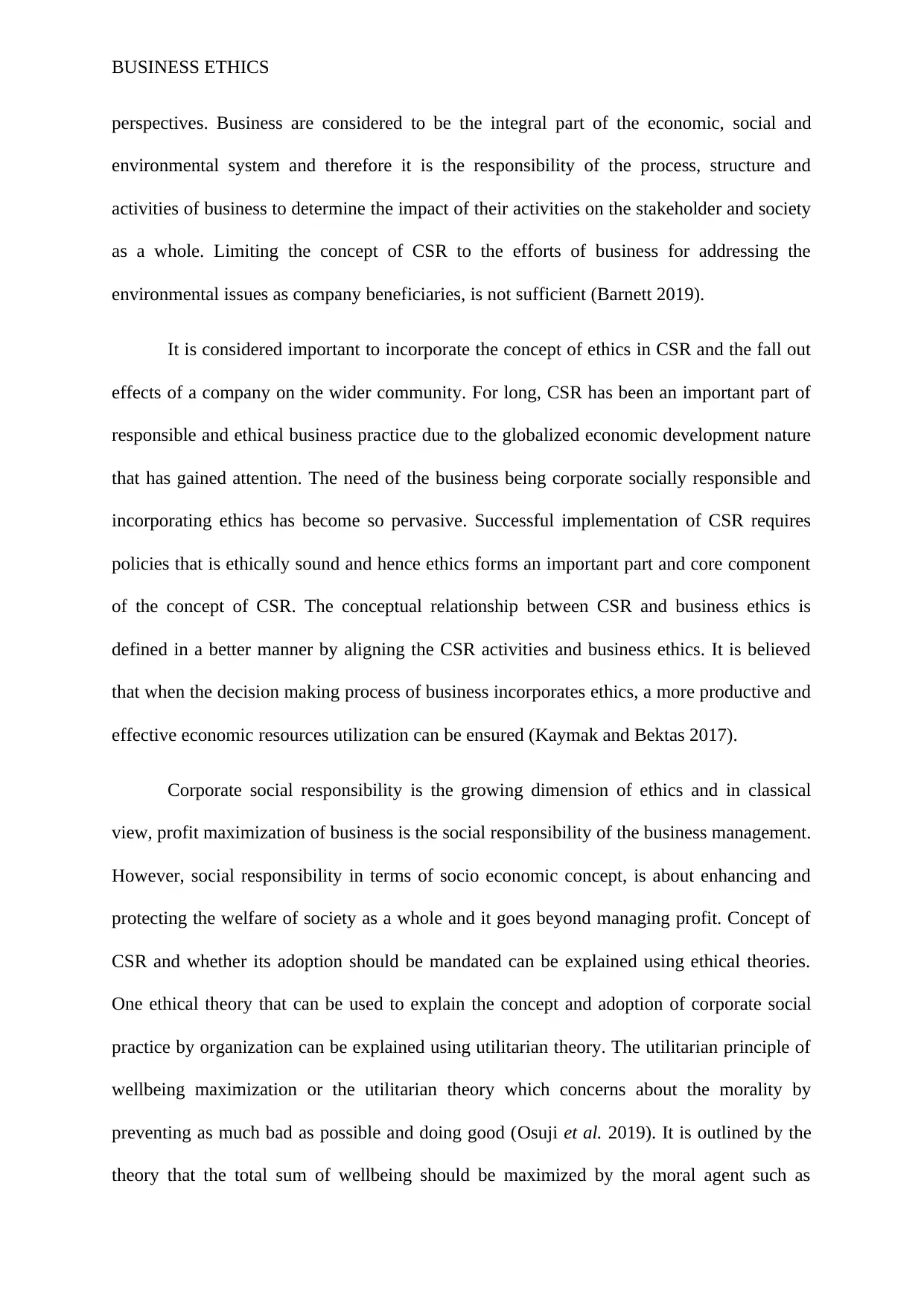
BUSINESS ETHICS
perspectives. Business are considered to be the integral part of the economic, social and
environmental system and therefore it is the responsibility of the process, structure and
activities of business to determine the impact of their activities on the stakeholder and society
as a whole. Limiting the concept of CSR to the efforts of business for addressing the
environmental issues as company beneficiaries, is not sufficient (Barnett 2019).
It is considered important to incorporate the concept of ethics in CSR and the fall out
effects of a company on the wider community. For long, CSR has been an important part of
responsible and ethical business practice due to the globalized economic development nature
that has gained attention. The need of the business being corporate socially responsible and
incorporating ethics has become so pervasive. Successful implementation of CSR requires
policies that is ethically sound and hence ethics forms an important part and core component
of the concept of CSR. The conceptual relationship between CSR and business ethics is
defined in a better manner by aligning the CSR activities and business ethics. It is believed
that when the decision making process of business incorporates ethics, a more productive and
effective economic resources utilization can be ensured (Kaymak and Bektas 2017).
Corporate social responsibility is the growing dimension of ethics and in classical
view, profit maximization of business is the social responsibility of the business management.
However, social responsibility in terms of socio economic concept, is about enhancing and
protecting the welfare of society as a whole and it goes beyond managing profit. Concept of
CSR and whether its adoption should be mandated can be explained using ethical theories.
One ethical theory that can be used to explain the concept and adoption of corporate social
practice by organization can be explained using utilitarian theory. The utilitarian principle of
wellbeing maximization or the utilitarian theory which concerns about the morality by
preventing as much bad as possible and doing good (Osuji et al. 2019). It is outlined by the
theory that the total sum of wellbeing should be maximized by the moral agent such as
perspectives. Business are considered to be the integral part of the economic, social and
environmental system and therefore it is the responsibility of the process, structure and
activities of business to determine the impact of their activities on the stakeholder and society
as a whole. Limiting the concept of CSR to the efforts of business for addressing the
environmental issues as company beneficiaries, is not sufficient (Barnett 2019).
It is considered important to incorporate the concept of ethics in CSR and the fall out
effects of a company on the wider community. For long, CSR has been an important part of
responsible and ethical business practice due to the globalized economic development nature
that has gained attention. The need of the business being corporate socially responsible and
incorporating ethics has become so pervasive. Successful implementation of CSR requires
policies that is ethically sound and hence ethics forms an important part and core component
of the concept of CSR. The conceptual relationship between CSR and business ethics is
defined in a better manner by aligning the CSR activities and business ethics. It is believed
that when the decision making process of business incorporates ethics, a more productive and
effective economic resources utilization can be ensured (Kaymak and Bektas 2017).
Corporate social responsibility is the growing dimension of ethics and in classical
view, profit maximization of business is the social responsibility of the business management.
However, social responsibility in terms of socio economic concept, is about enhancing and
protecting the welfare of society as a whole and it goes beyond managing profit. Concept of
CSR and whether its adoption should be mandated can be explained using ethical theories.
One ethical theory that can be used to explain the concept and adoption of corporate social
practice by organization can be explained using utilitarian theory. The utilitarian principle of
wellbeing maximization or the utilitarian theory which concerns about the morality by
preventing as much bad as possible and doing good (Osuji et al. 2019). It is outlined by the
theory that the total sum of wellbeing should be maximized by the moral agent such as
Paraphrase This Document
Need a fresh take? Get an instant paraphrase of this document with our AI Paraphraser

BUSINESS ETHICS
companies. The theory says that while maximizing the total sum of wellbeing, equal
importance should be placed on managing the wellbeing of humans. This implies that the
companies should be concerned about its own interest as well as the interest of its close and
distant stakeholders. Practicing the corporate socially responsible activities in accordance
with the utilitarian theory requires the organization to account for the activities that would
maximize the total sum of wellbeing. Practicing a policy of CSR according to the theory of
utilitarian has a major difference from the current CSR practice. According to the approach of
utilitarian theory, interest of everyone is accounted by the company as against the today’s
practice where the interest of stakeholder is accounted. The implication of the theory is that
the interest of closely related groups such as local community impacted by the activities of
company is just as important as the interest of faraway strangers who are not closely
associated with the organization (De Roeck and Farooq 2018).
From the discussion of the facts presented under the ethical theory of utilitarian, it is
implied from the combination of the demand of wellbeing maximization and the agent neutral
perspective of the theory that a large proportion of the resources of the company should be
directed towards the far stakeholders instead of closer stakeholders. This would like instead
of organization spending the money on relatively well off workers, resources would are used
to save the far away community dying from hunger (Carroll and Brown 2018). Therefore,
evaluating the utilitarian ethical theory requires the companies to reform their current practice
of CSR for promoting the total wellbeing. It would be demanded by utilitarian that the need
of faraway stakeholders should be fulfilled by the company. This is what makes the practical
application of utilitarian theory a bit difficult.
Utilitarian ethical theory can be considered as the motivating factor the companies to
practice CSR in promoting the total wellbeing and welfare of society and the utilitarian model
is followed by the business leaders practising ethical reasoning. One of the important source
companies. The theory says that while maximizing the total sum of wellbeing, equal
importance should be placed on managing the wellbeing of humans. This implies that the
companies should be concerned about its own interest as well as the interest of its close and
distant stakeholders. Practicing the corporate socially responsible activities in accordance
with the utilitarian theory requires the organization to account for the activities that would
maximize the total sum of wellbeing. Practicing a policy of CSR according to the theory of
utilitarian has a major difference from the current CSR practice. According to the approach of
utilitarian theory, interest of everyone is accounted by the company as against the today’s
practice where the interest of stakeholder is accounted. The implication of the theory is that
the interest of closely related groups such as local community impacted by the activities of
company is just as important as the interest of faraway strangers who are not closely
associated with the organization (De Roeck and Farooq 2018).
From the discussion of the facts presented under the ethical theory of utilitarian, it is
implied from the combination of the demand of wellbeing maximization and the agent neutral
perspective of the theory that a large proportion of the resources of the company should be
directed towards the far stakeholders instead of closer stakeholders. This would like instead
of organization spending the money on relatively well off workers, resources would are used
to save the far away community dying from hunger (Carroll and Brown 2018). Therefore,
evaluating the utilitarian ethical theory requires the companies to reform their current practice
of CSR for promoting the total wellbeing. It would be demanded by utilitarian that the need
of faraway stakeholders should be fulfilled by the company. This is what makes the practical
application of utilitarian theory a bit difficult.
Utilitarian ethical theory can be considered as the motivating factor the companies to
practice CSR in promoting the total wellbeing and welfare of society and the utilitarian model
is followed by the business leaders practising ethical reasoning. One of the important source

BUSINESS ETHICS
of intellectual interests to the ethicists of business is the relationship between society and
business (Pearson 2017). Therefore, there exist a close relationship between CSR and
business ethics. It is also affirmed by the normative stakeholder theory based on the ethical
philosophy that the concerns of an organization for its wide range of stakeholders such as
customers, stockholders employees, communities and vendors is its moral responsibility. It
has ben also confirmed that a holistic view in relation to the stakeholders is held by a socially
responsible firms and uses a triple bottom line for measuring its performance. Hence, one of
the fundamental business ethic principle is corporate responsibility in relation to stakeholders.
The ethical business and ethical behaviour impacts not only shareholders and stakeholders
but on the entire economy. Practicing CSR in accordance with the ethics and duties theory
requires the duties to be classified into obligations of solidarity, voluntary obligations and
universal natural duties. The membership of the company in the community give rise to
duties arising from the solidarity and on other hand, voluntary obligations arises from the
contractual agreements and consents. Companies should practice measures of CSR which
arise as their responsibility of duties and maintaining ethics resulting from any relationship
with the stakeholders (Werhane 2019).
Conducting the business in accordance with the codes of corporate social
responsibility would enable them to act ethically when it comes to serve the interest of wide
range of close and faraway stakeholders and also helps in promoting the wellbeing of society.
Complying or adherence to such codes helps the companies to promote environmental and
social responsibility at the workplace. Theory of ethics and duty does not suffer from
theoretical flaws and any practical difficulties unlike utilitarian ethical theory (Kaymak and
Bektas 2017). For the proper conduct of business, it is required by the companies to fulfil
certain moral duties as acknowledged by executives and prudent leaders.
of intellectual interests to the ethicists of business is the relationship between society and
business (Pearson 2017). Therefore, there exist a close relationship between CSR and
business ethics. It is also affirmed by the normative stakeholder theory based on the ethical
philosophy that the concerns of an organization for its wide range of stakeholders such as
customers, stockholders employees, communities and vendors is its moral responsibility. It
has ben also confirmed that a holistic view in relation to the stakeholders is held by a socially
responsible firms and uses a triple bottom line for measuring its performance. Hence, one of
the fundamental business ethic principle is corporate responsibility in relation to stakeholders.
The ethical business and ethical behaviour impacts not only shareholders and stakeholders
but on the entire economy. Practicing CSR in accordance with the ethics and duties theory
requires the duties to be classified into obligations of solidarity, voluntary obligations and
universal natural duties. The membership of the company in the community give rise to
duties arising from the solidarity and on other hand, voluntary obligations arises from the
contractual agreements and consents. Companies should practice measures of CSR which
arise as their responsibility of duties and maintaining ethics resulting from any relationship
with the stakeholders (Werhane 2019).
Conducting the business in accordance with the codes of corporate social
responsibility would enable them to act ethically when it comes to serve the interest of wide
range of close and faraway stakeholders and also helps in promoting the wellbeing of society.
Complying or adherence to such codes helps the companies to promote environmental and
social responsibility at the workplace. Theory of ethics and duty does not suffer from
theoretical flaws and any practical difficulties unlike utilitarian ethical theory (Kaymak and
Bektas 2017). For the proper conduct of business, it is required by the companies to fulfil
certain moral duties as acknowledged by executives and prudent leaders.
⊘ This is a preview!⊘
Do you want full access?
Subscribe today to unlock all pages.

Trusted by 1+ million students worldwide
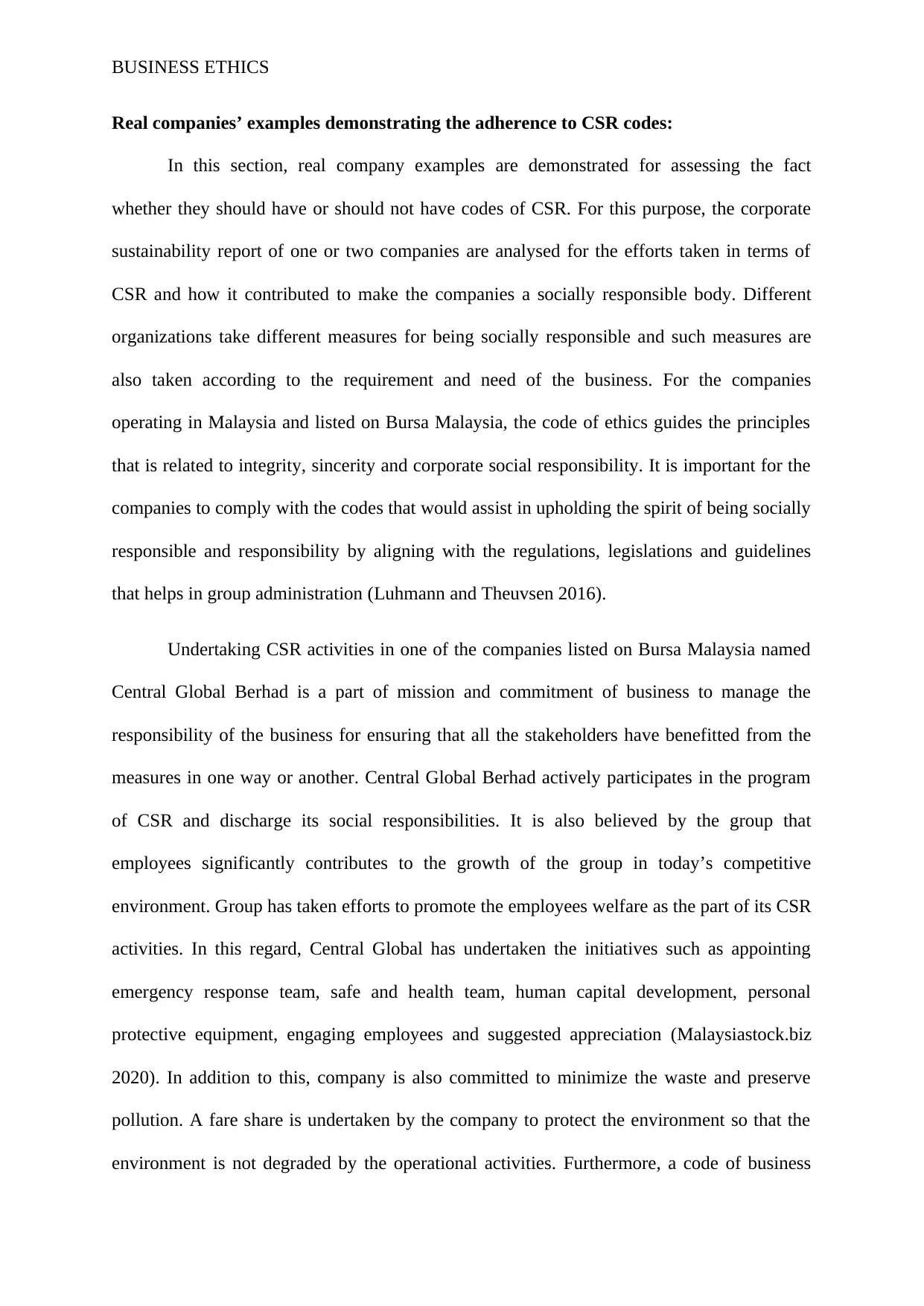
BUSINESS ETHICS
Real companies’ examples demonstrating the adherence to CSR codes:
In this section, real company examples are demonstrated for assessing the fact
whether they should have or should not have codes of CSR. For this purpose, the corporate
sustainability report of one or two companies are analysed for the efforts taken in terms of
CSR and how it contributed to make the companies a socially responsible body. Different
organizations take different measures for being socially responsible and such measures are
also taken according to the requirement and need of the business. For the companies
operating in Malaysia and listed on Bursa Malaysia, the code of ethics guides the principles
that is related to integrity, sincerity and corporate social responsibility. It is important for the
companies to comply with the codes that would assist in upholding the spirit of being socially
responsible and responsibility by aligning with the regulations, legislations and guidelines
that helps in group administration (Luhmann and Theuvsen 2016).
Undertaking CSR activities in one of the companies listed on Bursa Malaysia named
Central Global Berhad is a part of mission and commitment of business to manage the
responsibility of the business for ensuring that all the stakeholders have benefitted from the
measures in one way or another. Central Global Berhad actively participates in the program
of CSR and discharge its social responsibilities. It is also believed by the group that
employees significantly contributes to the growth of the group in today’s competitive
environment. Group has taken efforts to promote the employees welfare as the part of its CSR
activities. In this regard, Central Global has undertaken the initiatives such as appointing
emergency response team, safe and health team, human capital development, personal
protective equipment, engaging employees and suggested appreciation (Malaysiastock.biz
2020). In addition to this, company is also committed to minimize the waste and preserve
pollution. A fare share is undertaken by the company to protect the environment so that the
environment is not degraded by the operational activities. Furthermore, a code of business
Real companies’ examples demonstrating the adherence to CSR codes:
In this section, real company examples are demonstrated for assessing the fact
whether they should have or should not have codes of CSR. For this purpose, the corporate
sustainability report of one or two companies are analysed for the efforts taken in terms of
CSR and how it contributed to make the companies a socially responsible body. Different
organizations take different measures for being socially responsible and such measures are
also taken according to the requirement and need of the business. For the companies
operating in Malaysia and listed on Bursa Malaysia, the code of ethics guides the principles
that is related to integrity, sincerity and corporate social responsibility. It is important for the
companies to comply with the codes that would assist in upholding the spirit of being socially
responsible and responsibility by aligning with the regulations, legislations and guidelines
that helps in group administration (Luhmann and Theuvsen 2016).
Undertaking CSR activities in one of the companies listed on Bursa Malaysia named
Central Global Berhad is a part of mission and commitment of business to manage the
responsibility of the business for ensuring that all the stakeholders have benefitted from the
measures in one way or another. Central Global Berhad actively participates in the program
of CSR and discharge its social responsibilities. It is also believed by the group that
employees significantly contributes to the growth of the group in today’s competitive
environment. Group has taken efforts to promote the employees welfare as the part of its CSR
activities. In this regard, Central Global has undertaken the initiatives such as appointing
emergency response team, safe and health team, human capital development, personal
protective equipment, engaging employees and suggested appreciation (Malaysiastock.biz
2020). In addition to this, company is also committed to minimize the waste and preserve
pollution. A fare share is undertaken by the company to protect the environment so that the
environment is not degraded by the operational activities. Furthermore, a code of business
Paraphrase This Document
Need a fresh take? Get an instant paraphrase of this document with our AI Paraphraser
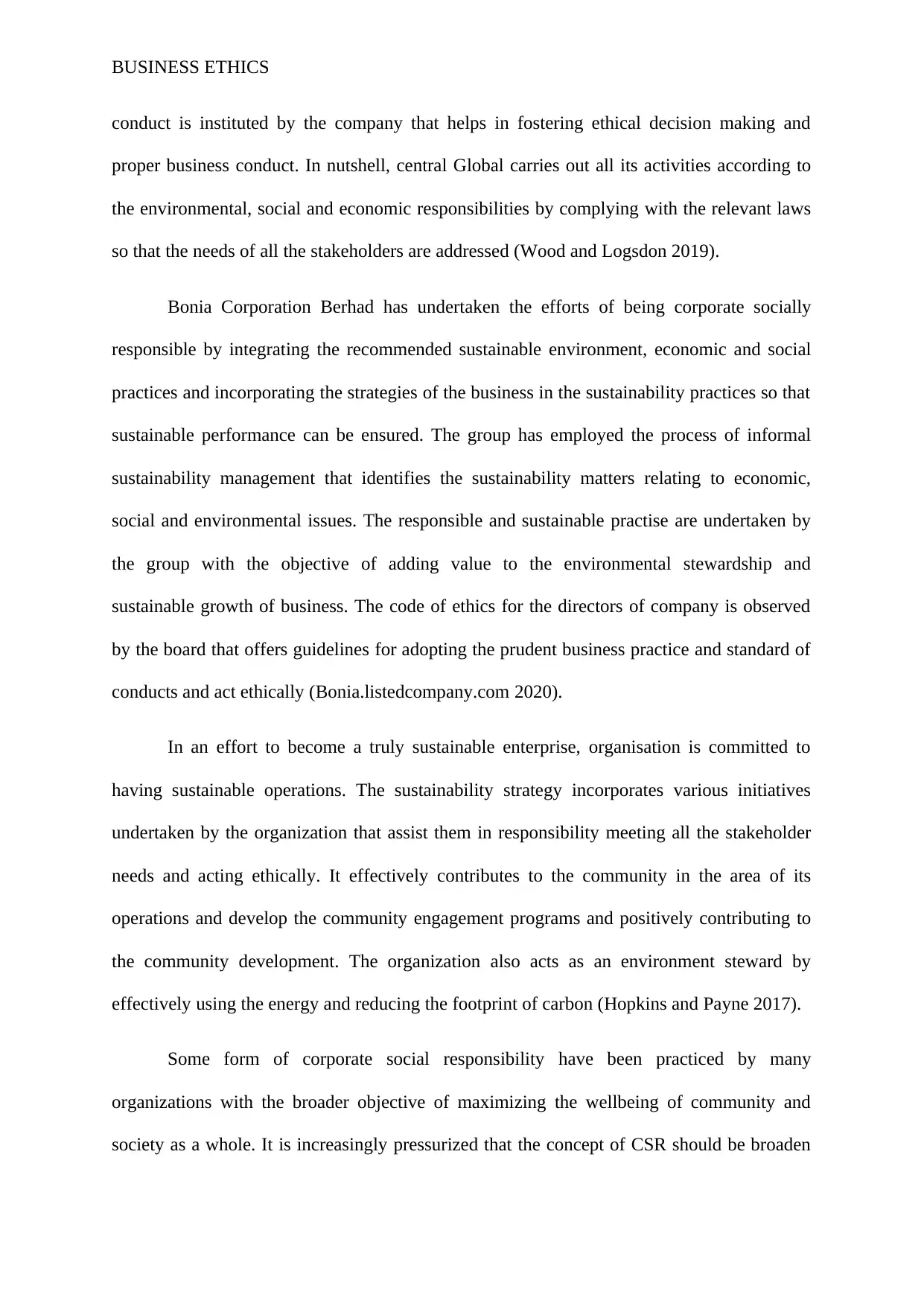
BUSINESS ETHICS
conduct is instituted by the company that helps in fostering ethical decision making and
proper business conduct. In nutshell, central Global carries out all its activities according to
the environmental, social and economic responsibilities by complying with the relevant laws
so that the needs of all the stakeholders are addressed (Wood and Logsdon 2019).
Bonia Corporation Berhad has undertaken the efforts of being corporate socially
responsible by integrating the recommended sustainable environment, economic and social
practices and incorporating the strategies of the business in the sustainability practices so that
sustainable performance can be ensured. The group has employed the process of informal
sustainability management that identifies the sustainability matters relating to economic,
social and environmental issues. The responsible and sustainable practise are undertaken by
the group with the objective of adding value to the environmental stewardship and
sustainable growth of business. The code of ethics for the directors of company is observed
by the board that offers guidelines for adopting the prudent business practice and standard of
conducts and act ethically (Bonia.listedcompany.com 2020).
In an effort to become a truly sustainable enterprise, organisation is committed to
having sustainable operations. The sustainability strategy incorporates various initiatives
undertaken by the organization that assist them in responsibility meeting all the stakeholder
needs and acting ethically. It effectively contributes to the community in the area of its
operations and develop the community engagement programs and positively contributing to
the community development. The organization also acts as an environment steward by
effectively using the energy and reducing the footprint of carbon (Hopkins and Payne 2017).
Some form of corporate social responsibility have been practiced by many
organizations with the broader objective of maximizing the wellbeing of community and
society as a whole. It is increasingly pressurized that the concept of CSR should be broaden
conduct is instituted by the company that helps in fostering ethical decision making and
proper business conduct. In nutshell, central Global carries out all its activities according to
the environmental, social and economic responsibilities by complying with the relevant laws
so that the needs of all the stakeholders are addressed (Wood and Logsdon 2019).
Bonia Corporation Berhad has undertaken the efforts of being corporate socially
responsible by integrating the recommended sustainable environment, economic and social
practices and incorporating the strategies of the business in the sustainability practices so that
sustainable performance can be ensured. The group has employed the process of informal
sustainability management that identifies the sustainability matters relating to economic,
social and environmental issues. The responsible and sustainable practise are undertaken by
the group with the objective of adding value to the environmental stewardship and
sustainable growth of business. The code of ethics for the directors of company is observed
by the board that offers guidelines for adopting the prudent business practice and standard of
conducts and act ethically (Bonia.listedcompany.com 2020).
In an effort to become a truly sustainable enterprise, organisation is committed to
having sustainable operations. The sustainability strategy incorporates various initiatives
undertaken by the organization that assist them in responsibility meeting all the stakeholder
needs and acting ethically. It effectively contributes to the community in the area of its
operations and develop the community engagement programs and positively contributing to
the community development. The organization also acts as an environment steward by
effectively using the energy and reducing the footprint of carbon (Hopkins and Payne 2017).
Some form of corporate social responsibility have been practiced by many
organizations with the broader objective of maximizing the wellbeing of community and
society as a whole. It is increasingly pressurized that the concept of CSR should be broaden
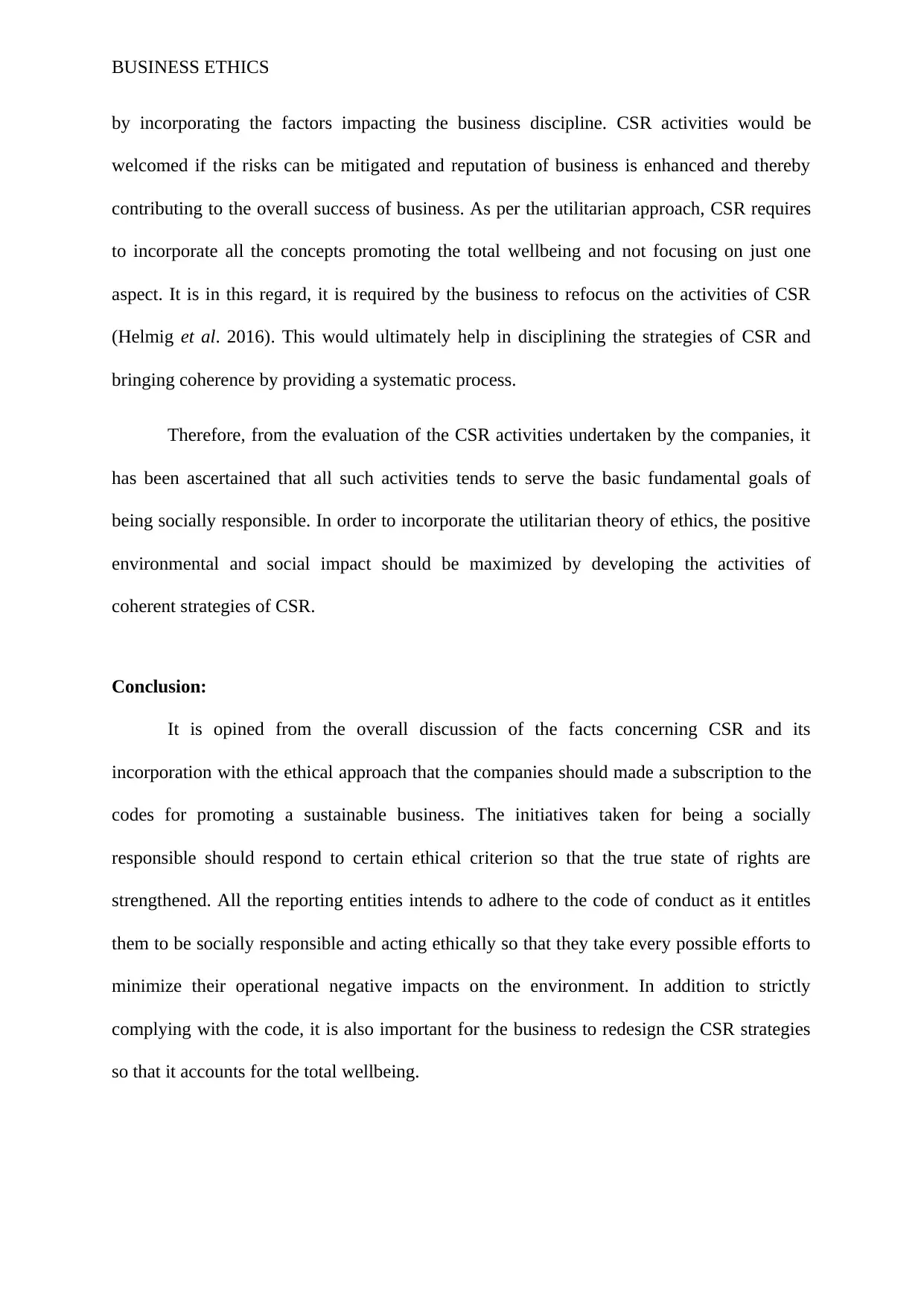
BUSINESS ETHICS
by incorporating the factors impacting the business discipline. CSR activities would be
welcomed if the risks can be mitigated and reputation of business is enhanced and thereby
contributing to the overall success of business. As per the utilitarian approach, CSR requires
to incorporate all the concepts promoting the total wellbeing and not focusing on just one
aspect. It is in this regard, it is required by the business to refocus on the activities of CSR
(Helmig et al. 2016). This would ultimately help in disciplining the strategies of CSR and
bringing coherence by providing a systematic process.
Therefore, from the evaluation of the CSR activities undertaken by the companies, it
has been ascertained that all such activities tends to serve the basic fundamental goals of
being socially responsible. In order to incorporate the utilitarian theory of ethics, the positive
environmental and social impact should be maximized by developing the activities of
coherent strategies of CSR.
Conclusion:
It is opined from the overall discussion of the facts concerning CSR and its
incorporation with the ethical approach that the companies should made a subscription to the
codes for promoting a sustainable business. The initiatives taken for being a socially
responsible should respond to certain ethical criterion so that the true state of rights are
strengthened. All the reporting entities intends to adhere to the code of conduct as it entitles
them to be socially responsible and acting ethically so that they take every possible efforts to
minimize their operational negative impacts on the environment. In addition to strictly
complying with the code, it is also important for the business to redesign the CSR strategies
so that it accounts for the total wellbeing.
by incorporating the factors impacting the business discipline. CSR activities would be
welcomed if the risks can be mitigated and reputation of business is enhanced and thereby
contributing to the overall success of business. As per the utilitarian approach, CSR requires
to incorporate all the concepts promoting the total wellbeing and not focusing on just one
aspect. It is in this regard, it is required by the business to refocus on the activities of CSR
(Helmig et al. 2016). This would ultimately help in disciplining the strategies of CSR and
bringing coherence by providing a systematic process.
Therefore, from the evaluation of the CSR activities undertaken by the companies, it
has been ascertained that all such activities tends to serve the basic fundamental goals of
being socially responsible. In order to incorporate the utilitarian theory of ethics, the positive
environmental and social impact should be maximized by developing the activities of
coherent strategies of CSR.
Conclusion:
It is opined from the overall discussion of the facts concerning CSR and its
incorporation with the ethical approach that the companies should made a subscription to the
codes for promoting a sustainable business. The initiatives taken for being a socially
responsible should respond to certain ethical criterion so that the true state of rights are
strengthened. All the reporting entities intends to adhere to the code of conduct as it entitles
them to be socially responsible and acting ethically so that they take every possible efforts to
minimize their operational negative impacts on the environment. In addition to strictly
complying with the code, it is also important for the business to redesign the CSR strategies
so that it accounts for the total wellbeing.
⊘ This is a preview!⊘
Do you want full access?
Subscribe today to unlock all pages.

Trusted by 1+ million students worldwide
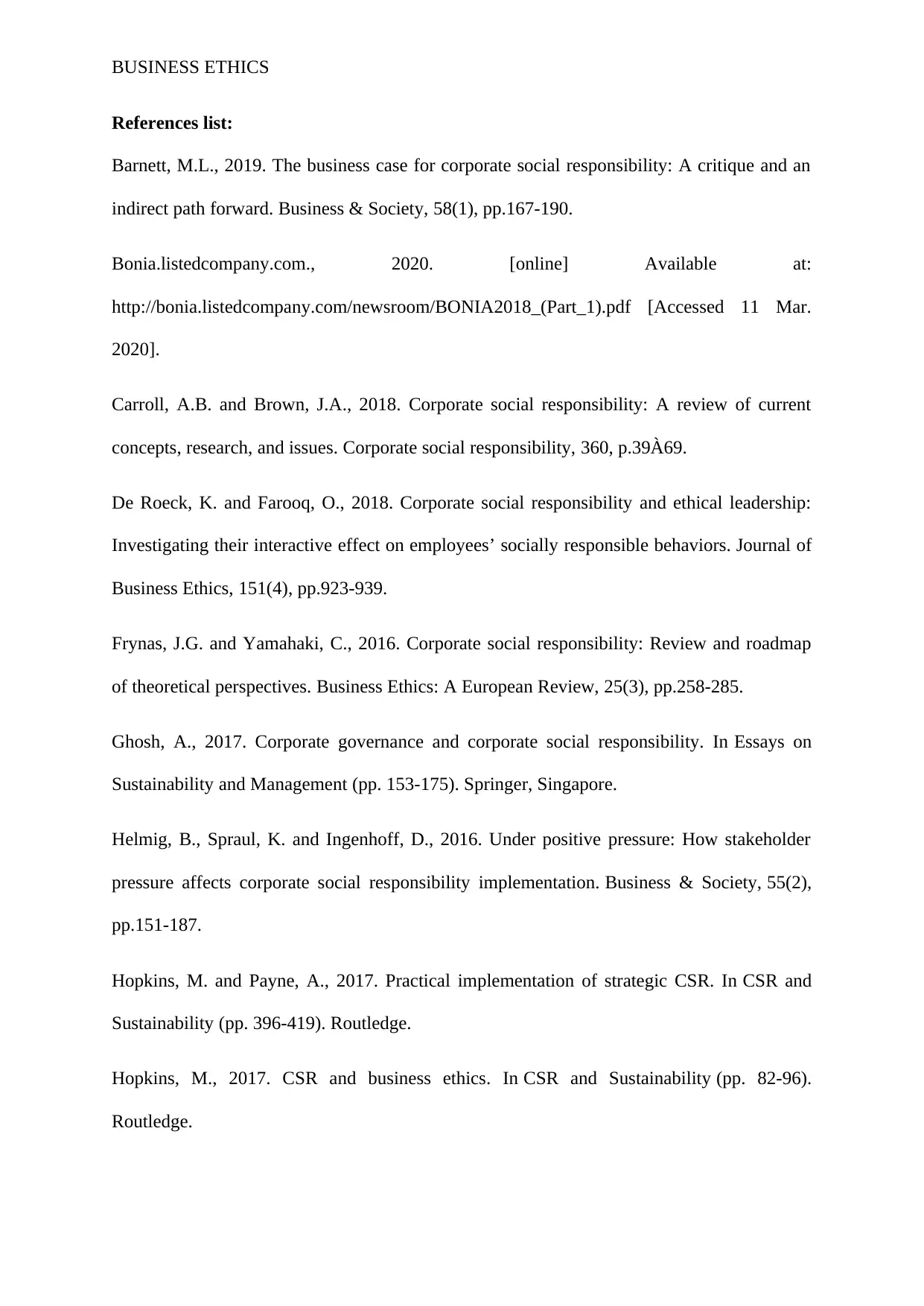
BUSINESS ETHICS
References list:
Barnett, M.L., 2019. The business case for corporate social responsibility: A critique and an
indirect path forward. Business & Society, 58(1), pp.167-190.
Bonia.listedcompany.com., 2020. [online] Available at:
http://bonia.listedcompany.com/newsroom/BONIA2018_(Part_1).pdf [Accessed 11 Mar.
2020].
Carroll, A.B. and Brown, J.A., 2018. Corporate social responsibility: A review of current
concepts, research, and issues. Corporate social responsibility, 360, p.39À69.
De Roeck, K. and Farooq, O., 2018. Corporate social responsibility and ethical leadership:
Investigating their interactive effect on employees’ socially responsible behaviors. Journal of
Business Ethics, 151(4), pp.923-939.
Frynas, J.G. and Yamahaki, C., 2016. Corporate social responsibility: Review and roadmap
of theoretical perspectives. Business Ethics: A European Review, 25(3), pp.258-285.
Ghosh, A., 2017. Corporate governance and corporate social responsibility. In Essays on
Sustainability and Management (pp. 153-175). Springer, Singapore.
Helmig, B., Spraul, K. and Ingenhoff, D., 2016. Under positive pressure: How stakeholder
pressure affects corporate social responsibility implementation. Business & Society, 55(2),
pp.151-187.
Hopkins, M. and Payne, A., 2017. Practical implementation of strategic CSR. In CSR and
Sustainability (pp. 396-419). Routledge.
Hopkins, M., 2017. CSR and business ethics. In CSR and Sustainability (pp. 82-96).
Routledge.
References list:
Barnett, M.L., 2019. The business case for corporate social responsibility: A critique and an
indirect path forward. Business & Society, 58(1), pp.167-190.
Bonia.listedcompany.com., 2020. [online] Available at:
http://bonia.listedcompany.com/newsroom/BONIA2018_(Part_1).pdf [Accessed 11 Mar.
2020].
Carroll, A.B. and Brown, J.A., 2018. Corporate social responsibility: A review of current
concepts, research, and issues. Corporate social responsibility, 360, p.39À69.
De Roeck, K. and Farooq, O., 2018. Corporate social responsibility and ethical leadership:
Investigating their interactive effect on employees’ socially responsible behaviors. Journal of
Business Ethics, 151(4), pp.923-939.
Frynas, J.G. and Yamahaki, C., 2016. Corporate social responsibility: Review and roadmap
of theoretical perspectives. Business Ethics: A European Review, 25(3), pp.258-285.
Ghosh, A., 2017. Corporate governance and corporate social responsibility. In Essays on
Sustainability and Management (pp. 153-175). Springer, Singapore.
Helmig, B., Spraul, K. and Ingenhoff, D., 2016. Under positive pressure: How stakeholder
pressure affects corporate social responsibility implementation. Business & Society, 55(2),
pp.151-187.
Hopkins, M. and Payne, A., 2017. Practical implementation of strategic CSR. In CSR and
Sustainability (pp. 396-419). Routledge.
Hopkins, M., 2017. CSR and business ethics. In CSR and Sustainability (pp. 82-96).
Routledge.
Paraphrase This Document
Need a fresh take? Get an instant paraphrase of this document with our AI Paraphraser
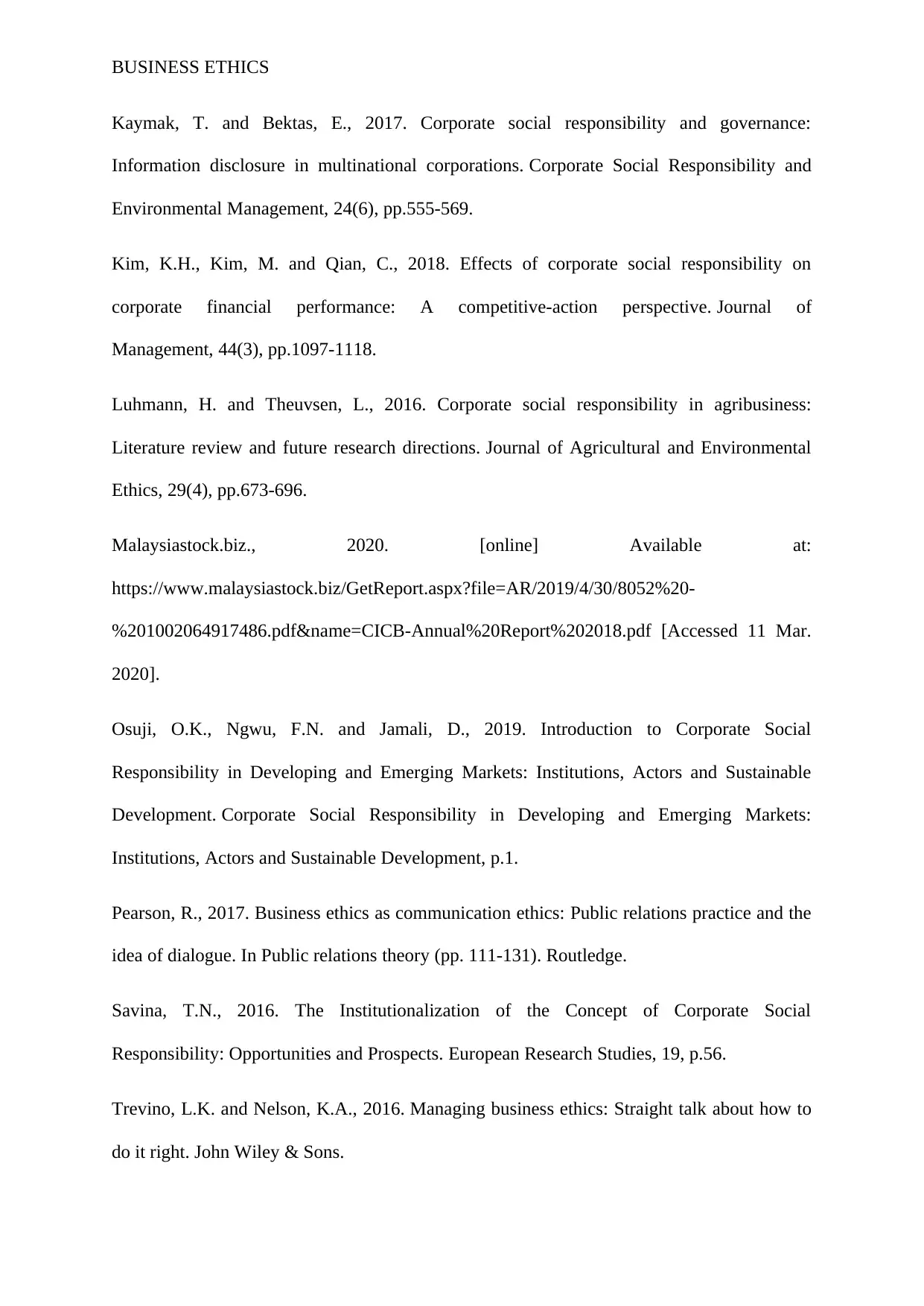
BUSINESS ETHICS
Kaymak, T. and Bektas, E., 2017. Corporate social responsibility and governance:
Information disclosure in multinational corporations. Corporate Social Responsibility and
Environmental Management, 24(6), pp.555-569.
Kim, K.H., Kim, M. and Qian, C., 2018. Effects of corporate social responsibility on
corporate financial performance: A competitive-action perspective. Journal of
Management, 44(3), pp.1097-1118.
Luhmann, H. and Theuvsen, L., 2016. Corporate social responsibility in agribusiness:
Literature review and future research directions. Journal of Agricultural and Environmental
Ethics, 29(4), pp.673-696.
Malaysiastock.biz., 2020. [online] Available at:
https://www.malaysiastock.biz/GetReport.aspx?file=AR/2019/4/30/8052%20-
%201002064917486.pdf&name=CICB-Annual%20Report%202018.pdf [Accessed 11 Mar.
2020].
Osuji, O.K., Ngwu, F.N. and Jamali, D., 2019. Introduction to Corporate Social
Responsibility in Developing and Emerging Markets: Institutions, Actors and Sustainable
Development. Corporate Social Responsibility in Developing and Emerging Markets:
Institutions, Actors and Sustainable Development, p.1.
Pearson, R., 2017. Business ethics as communication ethics: Public relations practice and the
idea of dialogue. In Public relations theory (pp. 111-131). Routledge.
Savina, T.N., 2016. The Institutionalization of the Concept of Corporate Social
Responsibility: Opportunities and Prospects. European Research Studies, 19, p.56.
Trevino, L.K. and Nelson, K.A., 2016. Managing business ethics: Straight talk about how to
do it right. John Wiley & Sons.
Kaymak, T. and Bektas, E., 2017. Corporate social responsibility and governance:
Information disclosure in multinational corporations. Corporate Social Responsibility and
Environmental Management, 24(6), pp.555-569.
Kim, K.H., Kim, M. and Qian, C., 2018. Effects of corporate social responsibility on
corporate financial performance: A competitive-action perspective. Journal of
Management, 44(3), pp.1097-1118.
Luhmann, H. and Theuvsen, L., 2016. Corporate social responsibility in agribusiness:
Literature review and future research directions. Journal of Agricultural and Environmental
Ethics, 29(4), pp.673-696.
Malaysiastock.biz., 2020. [online] Available at:
https://www.malaysiastock.biz/GetReport.aspx?file=AR/2019/4/30/8052%20-
%201002064917486.pdf&name=CICB-Annual%20Report%202018.pdf [Accessed 11 Mar.
2020].
Osuji, O.K., Ngwu, F.N. and Jamali, D., 2019. Introduction to Corporate Social
Responsibility in Developing and Emerging Markets: Institutions, Actors and Sustainable
Development. Corporate Social Responsibility in Developing and Emerging Markets:
Institutions, Actors and Sustainable Development, p.1.
Pearson, R., 2017. Business ethics as communication ethics: Public relations practice and the
idea of dialogue. In Public relations theory (pp. 111-131). Routledge.
Savina, T.N., 2016. The Institutionalization of the Concept of Corporate Social
Responsibility: Opportunities and Prospects. European Research Studies, 19, p.56.
Trevino, L.K. and Nelson, K.A., 2016. Managing business ethics: Straight talk about how to
do it right. John Wiley & Sons.

BUSINESS ETHICS
Werhane, P.H., 2019. The normative/descriptive distinction in methodologies of business
ethics. In Systems Thinking and Moral Imagination (pp. 21-25). Springer, Cham.
Wood, D.J. and Logsdon, J.M., 2019. Social issues in management as a distinct field:
Corporate social responsibility and performance. Business & Society, 58(7), pp.1334-1357.
Werhane, P.H., 2019. The normative/descriptive distinction in methodologies of business
ethics. In Systems Thinking and Moral Imagination (pp. 21-25). Springer, Cham.
Wood, D.J. and Logsdon, J.M., 2019. Social issues in management as a distinct field:
Corporate social responsibility and performance. Business & Society, 58(7), pp.1334-1357.
⊘ This is a preview!⊘
Do you want full access?
Subscribe today to unlock all pages.

Trusted by 1+ million students worldwide
1 out of 12
Related Documents
Your All-in-One AI-Powered Toolkit for Academic Success.
+13062052269
info@desklib.com
Available 24*7 on WhatsApp / Email
![[object Object]](/_next/static/media/star-bottom.7253800d.svg)
Unlock your academic potential
Copyright © 2020–2025 A2Z Services. All Rights Reserved. Developed and managed by ZUCOL.




